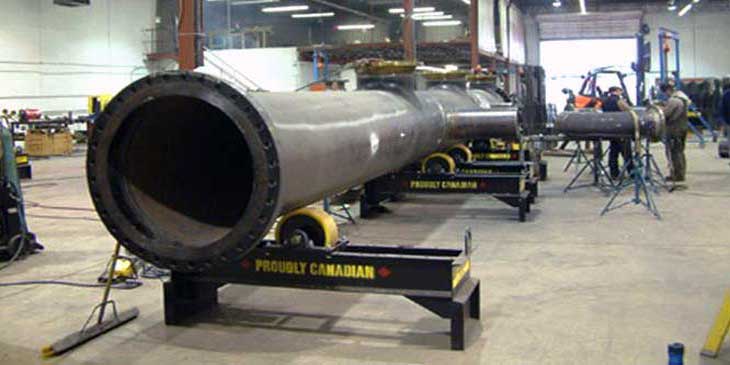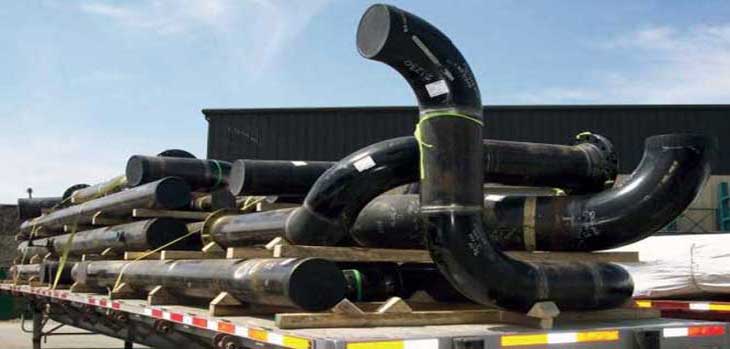Pre-Fabrication of Piping spools
The key to the success of whole project!
Industrial construction includes a wide range of projects, such as petroleum refineries and chemical and power plants. This type of construction involves intensive piping, which connects a variety of equipments and conveys process fluid and gas. Due to compressed schedule and limited space on site, industrial construction projects rely heavily on the offsite fabrication and assembly. As such, piping work is divided into two stages.. Pre-Fabrication of Pipe Spools and site installation.
Timely supply of pipe spools to module yard and installation site is the key to the success of whole project!
Pre-Fabrication of Pipe Spools
Pipe spools are fabricated from a number of raw pipes and pipe fittings (e.g. elbows, flanges, tees, etc.) in fabrication shops. Raw pipes are cut to the required sizes and moved with pipe fittings to a fitting table, where some of the components are fitted together (i.e. temporarily connected). The resulting sub-assembly (part of the final pipe spool) continues with welding operations (i.e. permanent connected) before it comes back to the fitting table and gets fitted with other spool components.
Spool fitting and welding can be grouped into two types..
- Roll fitting and welding
- Position fitting and welding
Roll fitting and welding means the main pipe can be turned by a rolling machine and the fitter or the welder does not have to change his position to perform the operation, whereas position fitting and welding occur when one or more branches of the main pipe exceed the clearance limit. In such case, the fitter or the welder has to move around the main pipe run to accomplish fitting or welding. As a result, position fitting and welding usually takes more time to finish than roll fitting and welding. To minimize number of position fitting and welding is one of the goals of pipe spool fabrication sequencing.
Pipe rolling machine in Pre-Fabrication shop
 Image..www.ljwelding.com
Image..www.ljwelding.com
Why pipe spools are pre-fabricated..
Shop Pre-Fabrication of pipe spools is a proven means for reducing field installation costs while providing the highest of quality in the products fabricated.
Pipe spools are often flanged to facilitate the connection to other spools. The fabrication of these spools is normally performed by specialist fabrication companies which are equipped with the required infrastructure.
The specialist fabricators work under defined set of quality management criteria to ensure the accuracy of fabrication in order to achieve the proper fit at site and to maintain the required technical parameters defined by the client.
Cost Savings in Pre-Fabrication, Inspection and Testing
- Quality of the work is easier to manage and maintain in a controlled environment. High accuracies on specified tolerances will avoid rework at site.
- Weather independent fabrication will minimize production delays.
- Prefabricated Spools are the perfect answer to severe skill and labor shortage. Users do not have to mobilize significant work force for fabrication of spools on site.
- Manufacturing in mass production, will result in lower manufacturing costs compared with site fabrication.
- Prefabricated Spools will take lesser fabrication / assembly time, thereby avoiding time and cost overruns.
- Prefabricated Spools will entail no or little investments in fabrication and testing equipments by users. Radiography, PMI, MPI, Ultrasonic tests, Hydro tests etc. can be performed better and effectively in controlled environments.
- Prefabricated Spools will be serviced under the strict vigilance of Third Party Inspection Agencies, ensuring 100% adherence to required quality standards.
- Better control on welding parameters in controlled environments resulting in lesser probability of rework at site.
- Weld less Induction Bends (as permitted by the client) would entail complete avoiding of welding pipe sections using SR elbows, thereby bringing in significant cost savings in welding, radiography of welding joints and material requirements.
- Lesser dependency on power availability, avoiding unnecessary time delays.
- Improved safety in better manufacturing conditions than on site.
- Fabricating spools off site means less slag, abrasive dust, smoke and other contaminants which are unacceptable in highly hygienic food processing and other industries.
Pipe Spools ready for transport

The main disadvantage of making Pipe Spools
Of course, the making of pipe spools has tremendous benefits, but the biggest drawback is that the spools will not fit on site.
This can have several causes, but often it is a misinterpreted isometric by the contractor, or a faulty dimensions on a isometric.
One small mistake can result in a lot of extra work because e.g. multiple pipe spools must be modified. That often means that pressure tests must be done again, x-rays of the welds must be done again etc. etc..
Pre-Fabrication of Piping spools
Remark(s) of the Author...
Check dimensions (on Site), (in Field) etc.
If you see that on your isometric(s), basically you can not fabricate the pipe spool(s).
The engineer / draftsman means, that the piping contractor must determine the correct dimensions in the field.
At the time of contract negotiations, you as contractor must be very alert to this often underrated "insignificant" comments.
If not, you will "have to bring money" for a job where you just want to earn money.
If these things in advance not properly negotiated, a (sometimes high) conflict between engineering company and contractor will arise during the implementation period.
What do you think who will win?